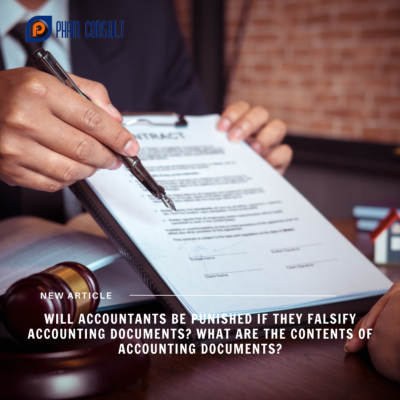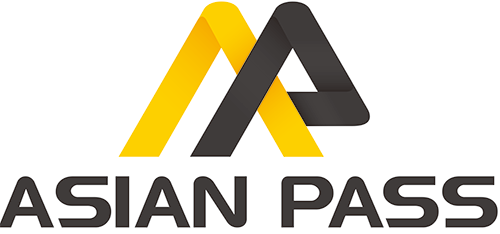How much administrative fine can accountants be fined for falsifying accounting documents? What content does an accounting document contain? Are electronic documents considered accounting documents that do not comply with current regulations? Through today’s article, Pham Consult will help you learn more about this issue!

Will accountants be penalized for falsifying accounting documents?
According to Clause 3, Article 3 of the 2015 Accounting Law, the following terms are explained?
Explanation of terms
….
3. Accounting documents are documents and information carriers reflecting economic and financial transactions that have arisen and been completed, serving as a basis for accounting entries.
According to Article 8 of Decree 41/2018/ND-CP, the penalties for violations of regulations on accounting documents are as follows:
Penalties for violations of regulations on accounting documents
…
3. A fine of VND 20,000,000 to VND 30,000,000 shall be imposed for one of the following acts:
a) Forging or falsifying accounting documents but not to the extent of criminal prosecution;
b) Agreeing or forcing others to forge or falsify accounting documents but not to the extent of criminal prosecution;
c) Making accounting documents with different contents in the copies in case of having to make accounting documents with multiple copies for an economic or financial transaction;
d) Not making accounting documents when an economic or financial transaction arises;
dd) Making accounting documents multiple times for an economic or financial transaction;
e) Making payments when payment vouchers do not have full signatures of authorized persons as prescribed by law on accounting.
4. Remedial measures:
a) Supplementing incomplete elements of vouchers for the acts specified in Point a, Clause 1 of this Article;
b) Forcing the cancellation of falsely declared or forged accounting vouchers for the acts specified in Point a, Clause 3 of this Article;
c) Forcing the establishment of additional vouchers that have not been established when economic and financial transactions arise for the acts specified in Point d, Clause 3 of this Article;
d) Forcing the cancellation of accounting vouchers that have been established multiple times for an economic and financial transaction arising for the acts specified in Point d, Clause 3 of this Article.
Thus, accountants who falsify accounting vouchers may be subject to an administrative fine of from VND 20,000,000 to VND 30,000,000 and forced to cancel falsely declared accounting vouchers.
What are the contents of accounting documents?
According to Article 16 of the 2015 Law on Accounting, the contents of accounting documents are as follows:
Content of accounting documents
1. Accounting documents must have the following main contents:
a) Name and reference number of accounting documents;
b) Date, month, year of making accounting documents;
c) Name and address of the agency, organization, unit or individual making accounting documents;
d) Name and address of the agency, organization, unit or individual receiving accounting documents;
dd) Content of economic and financial transactions arising;
e) Quantity, unit price and amount of economic and financial transactions recorded in numbers; total amount of accounting documents used to collect and pay money recorded in numbers and in words;
g) Signature, full name of the person making, approving and those related to accounting documents.
2. In addition to the main contents of accounting documents specified in Clause 1 of this Article, accounting documents may have additional contents depending on each type of document.
Thus, accounting documents have the following contents:
– Name and reference number of accounting documents;
– Date, month, year of making accounting documents;
– Name and address of the agency, organization, unit or individual making accounting documents;
– Name and address of the agency, organization, unit or individual receiving accounting documents;
– Content of economic and financial transactions arising;
– Quantity, unit price and amount of economic and financial transactions recorded in numbers; total amount of accounting documents used to collect and pay money recorded in numbers and in words;
– Signature, full name of the person making, approving and those related to accounting documents.
Are electronic documents considered accounting documents?
According to Article 17 of the 2015 Accounting Law, electronic documents are regulated as follows:
Electronic documents
1. Electronic documents are considered accounting documents when they contain accounting documents and are expressed in the form of electronic data, encrypted without being changed during transmission via computer networks, telecommunications networks or on information carriers such as magnetic tapes, magnetic disks, and payment cards.
2. Electronic documents must ensure the security and preservation of data and information during use and storage; must be managed and checked against all forms of exploitation, intrusion, copying, theft or use of electronic documents in violation of regulations. Electronic documents are managed as accounting documents in the original form in which they were created, sent or received, but must have adequate equipment for use.
3. When paper documents are converted into electronic documents for transactions and payments or vice versa, the electronic documents are valid for performing those economic and financial transactions. Paper documents are only valid for keeping records, monitoring and checking, and are not valid for transactions and payments. Thus, electronic documents are considered accounting documents when they contain accounting documents and are expressed in the form of electronic data, encoded without being changed during transmission over computer networks, telecommunications networks or on information carriers such as magnetic tapes, magnetic disks, and payment cards.
According to Article 17 of the 2015 Accounting Law, electronic documents are regulated as follows:
Electronic documents
1. Electronic documents are considered accounting documents when they contain accounting documents and are expressed in the form of electronic data, encrypted without being changed during transmission via computer networks, telecommunications networks or on information carriers such as magnetic tapes, magnetic disks, and payment cards.
2. Electronic documents must ensure the security and preservation of data and information during use and storage; must be managed and checked against all forms of exploitation, intrusion, copying, theft or use of electronic documents in violation of regulations. Electronic documents are managed as accounting documents in the original form in which they were created, sent or received, but must have adequate equipment for use.
3. When paper documents are converted into electronic documents for transactions and payments or vice versa, the electronic documents are valid for performing those economic and financial transactions. Paper documents are only valid for keeping records, monitoring and checking, and are not valid for transactions and payments. Thus, electronic documents are considered accounting documents when they contain accounting documents and are expressed in the form of electronic data, encoded without being changed during transmission over computer networks, telecommunications networks or on information carriers such as magnetic tapes, magnetic disks, and payment cards.
Comments




 VI
VI